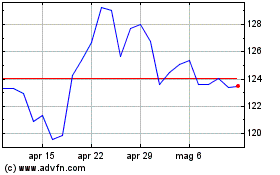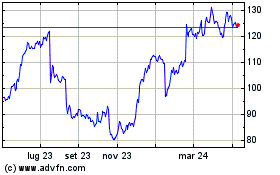RBS's U.S. Bank Subsidiary Wants To Grow Student Lending
16 Maggio 2012 - 12:27AM
Dow Jones News
Many students looking for a college loan have a new choice: RBS
Citizens Financial Group.
The U.S. banking subsidiary of Royal Bank of Scotland Group PLC
(RBS, RBS.LN) is expanding its student lending business beyond the
12 states where it has bank branches--an expansion that coincides
with some banks pulling back from a business that has raised
concerns about the level of debt young people have to shoulder.
But RBS Citizens is putting a stake in the ground--right next to
banks like Wells Fargo & Co. (WFC) and Discover Financial
Services (DFS), which have also said they wants to grow rather than
shrink student lending.
The cost of college continues to rise and private student loans
provide financial flexibility beyond government student loans, said
Brendan Coughlin, the president of RBS Citizens' education finance
business. "I don't believe" student lending "is the next bubble,"
he said. "There is no doubt that the cost of education is outpacing
inflation, and it's an issue for America."
The bank started to make student loans in 2009, and the
retrenching of some banks made the decision to expand easier,
Coughlin said.
"Some of the students who banked with us were able to get a loan
to one school but not the other" because RBS Citizens would lend
only in the states where it had branches, he said. Now students can
apply to schools in all 48 contiguous states and apply from states
where RBS Citizens has no branches.
RBS Citizens, which is branded Charter One in Midwestern
markets, was a rapidly expanding bank before the financial crisis,
growing from its New England roots into the Midwest. But the
mortgage-related trouble of its parent has raised speculation over
whether the Edinburgh, U.K., bank might sell rather than expand its
U.S. banking operations. RBS had to be bailed out and is majority
owned by the British government.
But those speculations have died down, and the bank has been
growing its commercial banking business lately. Student lending
another business where RBS Citizens believes it can gain market
share.
The bank will only lend to students at not-for-profit
universities, about 90% of loans are co-signed, usually by a
parent, and those who don't have a co-signer have to show income.
RBS Citizens doesn't disclose its default rate, but Coughlin said
it is "very significantly below" the 8% for U.S. government student
loans.
J.P. Morgan Chase & Co. (JPM) recently decided to restrict
student loans to customers who do other business with the bank.
"The private student loan market has continued to decline and
government programs have expanded to help more students," the bank
had previously said in a statement.
U.S. Bancorp (USB) stopped making student loans all together
last year. The Minneapolis bank had said it was "relatively small"
in private student lending and "decided to ... move resources to
other areas."
Citigroup Inc. (C) sold its Student Lending Corp. as part of its
decision during the financial crisis to slim down. Discover
Financial Services (DFS) bought it, and wants to expand.
"As some look to exit the business, we'll capitalize on these
opportunities to strengthen our market position," Mark Graf, chief
financial officer of Discover, said at an investor conference
Tuesday. "College students are upwardly mobile and mostly new to
Discover, allowing us to establish an early relationship and to
subsequently build on it," Graf said.
Wells Fargo's Chief Financial Officer Timothy Sloan told Dow
Jones last month, "The last time I checked, a third of the people
in this country go to college and a good portion of those need to
borrow some money to do that." Like RBS Citizens now, it too lends
to customers who do their banking with Wells Fargo as well as with
students who, at least initially, only need a loan.
"Private student loans are a risky way to finance higher
education," said Haley Chitty, the director of communications at
the National Association of Student Financial Aid Administrators,
an advocacy group. "They lack the consumer protections and benefits
of federal student loans." But "these loans are a vital resource
for some students looking to cover the growing gap between rising
college costs and what they can get in student aid and federal
student loans."
Coughlin said he makes students and parents aware of the risk,
and in some cases discourage them from borrowing because a
government loan fits better. But for other borrowers, the terms
"are very competitive with the government program. For some
families, this is actually the more affordable option."
-By Matthias Rieker, Dow Jones Newswires; 212-416-2471;
matthias.rieker@dowjones.com
--Andrew R. Johnson contributed to this article.
Grafico Azioni Discover Financial Servi... (NYSE:DFS)
Storico
Da Giu 2024 a Lug 2024

Grafico Azioni Discover Financial Servi... (NYSE:DFS)
Storico
Da Lug 2023 a Lug 2024
